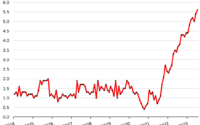BIS Warns of Leverage, Liquidity Risks, and the Need for a Fed Backstop – Mish Talk
Liquidity risk in MBS markets
Please consider the Bank of International Settlements BIS Quarterly Review for December 2022.
There are emerging signs of fragility in the markets for agency mortgage-backed securities (MBS). As MBS trading volumes declined in 2022, their yield spreads over US Treasuries became unusually volatile compared with those over the past 35 years.
A shift in the composition of MBS buyers in 2022 could be a sign that the market has become more prone to bouts of volatility. Small investors and leveraged funds have become the main buyers, and they have been traditionally less forthcoming than banks in providing liquidity in times of stress. At the same time, monetary policy priorities may make it challenging for the Federal Reserve to backstop the MBS market, should the need arise. In this environment, surges in selling pressure could be particularly disruptive.
Among key market participants, closed-end funds known as mortgage real estate investment trusts (mREITs) are relatively prone to selling rapidly in times of stress. Large amounts of debt – often in the form of short-term repos – allow mREITs to pay out double-digit yields, even if they mostly invest in low-risk securities. High leverage and maturity mismatches imply that mREITs can be an important source of fire sales, even though they hold a small share of MBS outstanding (between 1.5% and 5% over the past 10 years).
With a history of high liquidity demand in times of stress, mREITs remain a potential source of market dysfunction, especially if banks and the central bank continue to pull back. Liquidity disruptions in the MBS market could have material systemic implications. First of all, MBS play a crucial role in facilitating credit to the US real estate sector. In addition, since MBS are near substitutes for US Treasuries, liquidity strains could reverberate more broadly in financial markets. The role of leverage and maturity mismatches in shaping fire sale risk in MBS markets, together with potential wide-ranging ramifications, is a reminder of the policy challenges in containing risk in non-bank financial intermediation.
Leverage and liquidity Backstops: Cues From Pension Funds
The market for UK sovereign bonds (gilts) experienced significant turmoil in late September. A sharp rise in yields, set off by the then announced change in the UK fiscal stance, was amplified by forced selling due to rapid deleveraging by investment vehicles used by pension funds.
Liquidity in the gilt market started to worsen on 22 September 2022, when the Bank of England announced a 50 basis point rate hike, and deteriorated rapidly the following day. A surge in yields was precipitated by plans for an expansionary fiscal programme featuring tax cuts and energy subsidies. In addition, the gilt market witnessed unusually large trading volumes, a sharp widening of bid-ask spreads and a significant depreciation of sterling. Markets returned to normal only when the Bank of England committed to purchase large amounts of long-dated gilts on 28 September.
As gilt yields rose rapidly in September, LDI funds came under severe pressure, in contrast to pension funds themselves. The yields’ rise generated losses for LDIs’ leveraged positions and triggered calls for additional collateral. To meet these calls, LDIs needed cash infusions, which pension funds failed to provide promptly enough. The infusions were particularly slow to come for “pooled LDIs”, which manage assets on behalf of multiple pension funds.
The stress episode in the gilt market holds broad lessons for non-bank financial intermediaries (NBFIs). Financial stability risks from high leverage and inadequate market liquidity are not confined to the pension fund sector. Indeed, long periods of low interest rates have incentivised a reach for yield and leverage build-up by financial institutions across the spectrum, including more innovative forms of securitisation, such as those of private equity funds. With rapid increases in interest rates and receding liquidity in core markets, simultaneous deleveraging can generate liquidity demand pressure, which could lead to market dysfunction.
In addition, strategies that involve duration matching could create similar pressures, eg when a sharp rise in interest rates shortens liability duration, and prompts asset sales in a falling market. When these risks materialise and the attendant economic costs are substantial, there will be pressure on central banks to provide backstops – as market-makers of last resort. While justified, this can contrast with the monetary policy stance and encourage risk-taking in the longer run. Such dilemmas highlight the urgency of implementing systemically oriented regulation that addresses structural vulnerabilities in the NBFI sector
Meanwhile
Scroll to Continue
On the Brighter Side
Other than leverage, liquidity, massive economic divergences, a collapsing housing market, technology layoffs, inept energy policy, inept trade policy, overpriced stocks, and a clueless Fed that thinks it knows what it’s doing, things look pretty good especially for those with a pile of cash and no debt.
This post originated at MishTalk.Com
Please Subscribe!
Like these reports? I hope so, and if you do, please Subscribe to MishTalk Email Alerts.
Subscribers get an email alert of each post as they happen. Read the ones you like and you can unsubscribe at any time.
If you have subscribed and do not get email alerts, please check your spam folder.
Mish
[ad_2]
Source link



